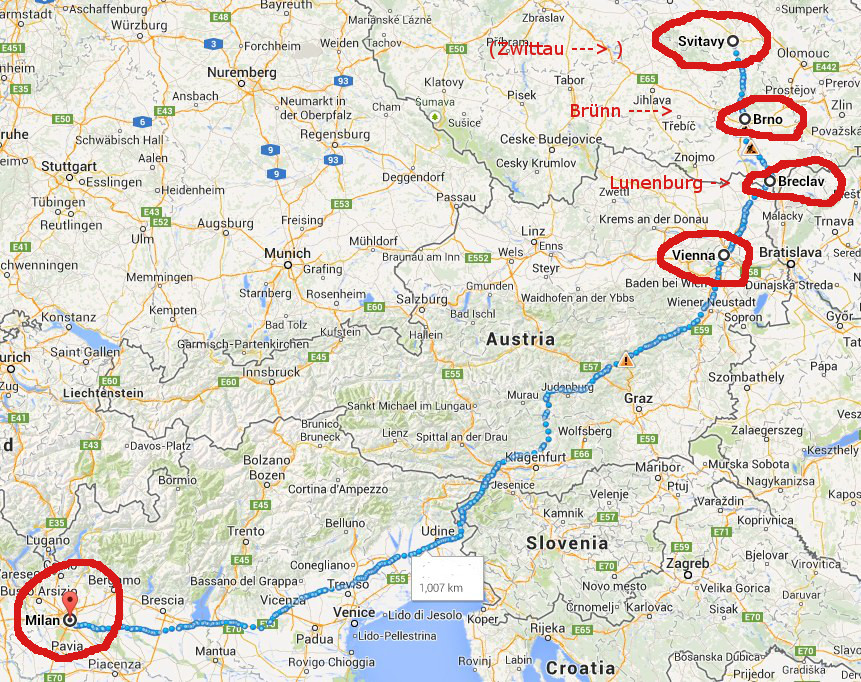
The Life and Times of Hubert Brooks M.C. C.D.
A Canadian Hero

 |
|
 |
I remained in camp for about 3 weeks after discharge from the hospital then got out on another working party.
This time I decided I would try an escape southward across the Czechoslovak border with the ultimate intention of reaching the South of France. I met up with an Armenian, Sgt. Joseph Sidi, serving with the British Army who knew the Mediterranean area well and was eager to join me in the escape plan.
We selected a work party at Zwittau (Svitavy in Czech) in the Sudetenland conveniently close to the Czech border (Sudetenland is the German name used in English in the first half of the 20th century for the western regions of Czechoslovakia inhabited mostly by ethnic Germans). We arrived on 8th September 1942 and were billeted in a two–storey house with guards on the ground floor. We started work there as section–men on the railroad. It was now a full two months since my re–capture and I was itching to escape again. So, it turned out, were at least 10 of the 60 men on the work party.
Our guards must have sensed this for every night at 10 they would gather up all our pants and shoes and lock them away in a bolted room.
Six of us decided to make the actual break together this time, and then go our separate ways once we were on the ground.
Once again, we chose a Saturday night for the break and scheduled a boxing match in the mess hall as a suitably noisy diversion. While the gloves thudded and the boys booed and cheered, we sawed through the window bars in the all important trouser room with stolen hacksaw blades. We left the bars in position until after our guards made their last round and gathered up our pants and shoes.

By midnight September 10th 1942, we were decently clad and ready to go. We knotted together the traditional rope of blankets for the descent from our second floor quarters.
Beneath one possible escape window, a street lamp gleamed brightly and beneath the window on the far side, ran a lovers' lane. We chose lovers' lane, and luckily romance wasn't flourishing in Zwittau that Saturday night. Leaving in pairs, all six of us slipped away unnoticed into the night.
Sgt. Sidi and I headed due south across the mountains toward Brünn (Brünn was the German designation. Today this Czech city is known as Brno.) and then south about 30 miles to Lunenburg (Lunenburg was the German designation whereas today the Czech town is known as Břeclav). In Brünn we were very nearly caught, not by the Germans but by the irate owner of an apple orchard we were raiding. We hurriedly pulled out our mustard–tin Union Jack and explained who we were. The farmer called his police dog to heel and loaded us with so many apples that we could barely walk. The next evening while attempting to cross a railway bridge, we were nearly shot by a German guard.
I had discovered while working at the Johanna Shaft Mine (Gräfin Johanna Schacht coal mine), that the Germans were loading coal and lumber on freight cars in Beuthen for Italy. These freight cars were routed through Lunenburg – Vienna – Brenner Pass to Milan in northern Italy. Our information proved correct and we had only to scour the Lunenburg marshalling yards for a short time before we came across an open freight car laden with huge lumps of coal destined for Milan.
Very carefully we burrowed down into the coal making sure not to disturb a line white-washed across the top load for inspection purposes.
For the next 24 hours we jolted along buried in our small cave of coal and at dawn we reached the railway yards on the outskirts of Vienna. To our dismay our car was switched to a siding. There was no knowing how long it might stay there.
We decided to slip away and return that night so we left the train and spent the day hiding in the woods. It felt wonderful to stretch.
However it turned out to have been a terrible mistake to leave the sanctuary of our coal cave on the freight car.
| PREVIOUS PAGE | GO TO TOP OF PAGE FOR INTER- and INTRA- CHAPTER NAVIGATION MENUS |
NEXT PAGE |
The Life and Times of Hubert Brooks M.C. C.D.